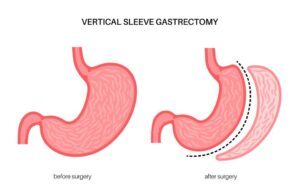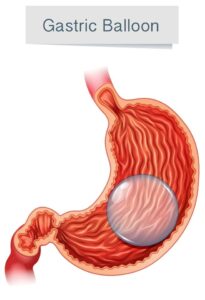Some of the most effective ways to combat obesity include:
Eating a healthy, balanced diet that is low in calories and high in nutrient-rich foods like fruits, vegetables, and lean proteins.
Getting regular physical activity, such as through daily walks, jogging, or other forms of exercise.
Limiting your intake of sugary drinks and high-fat, processed foods.
Monitoring your weight and body mass index (BMI) regularly to track your progress.
Seeking support from friends, family, or a healthcare provider to help you make healthy lifestyle changes.
In some cases, medication or weight loss surgery may be recommended by a doctor to help you lose weight. It’s important to discuss all of your options with a healthcare provider to determine the best course of action for your individual situation.
Gastric sleeve surgery, also known as sleeve gastrectomy, is a type of weight loss surgery that involves removing a large part of the stomach to create a smaller, sleeve-shaped stomach. This surgery is typically performed laparoscopically, which means that it is done using small incisions and specialized surgical tools. The smaller stomach is able to hold less food, which can help people lose weight by reducing the amount of food they can eat at one time. In addition, the surgery can also help to reduce hunger and increase feelings of fullness after eating. Overall, gastric sleeve surgery can be an effective tool for people who are struggling with obesity and want to lose weight.
As with any surgical procedure, there are potential risks and complications associated with gastric sleeve surgery. Some of the most common risks include infection, blood clots, and leaks in the gastrointestinal tract. In some cases, patients may also experience stomach pain, nausea, and vomiting after the surgery. It’s important to discuss these risks with your doctor before undergoing the procedure.

Gastric sleeve surgery, also known as sleeve gastrectomy, is a type of weight loss surgery that involves removing a large portion of the stomach. This procedure is typically recommended for people who are severely obese and have not been able to lose weight through other means, such as diet and exercise. In order to be eligible for gastric sleeve surgery, you will need to meet certain criteria, including:
Having a body mass index (BMI) of 40 or higher, or a BMI of 35 or higher with obesity-related health conditions such as type 2 diabetes or heart disease.
Being at least 18 years old.
Having tried other weight loss methods, such as diet and exercise, without success.
Being committed to making lifestyle changes, such as following a healthy diet and getting regular physical activity, after the surgery.
Being in overall good health, with no medical conditions that would make the surgery risky.
It’s important to discuss your individual situation with a healthcare provider to determine if gastric sleeve surgery is right for you.
A gastric balloon is a non-surgical weight loss procedure in which a balloon is placed in the stomach to help people feel fuller and eat less. The balloon is inserted through the mouth and into the stomach using a thin, flexible tube. Once it is in place, the balloon is inflated with a saline solution to take up space in the stomach. This can help people feel fuller after eating smaller amounts of food, which can lead to weight loss. The balloon is typically left in place for a period of six months, during which time people are encouraged to follow a healthy diet and exercise regularly to support weight loss. After six months, the balloon is removed in a non-surgical procedure.

A gastric balloon is a medical device that is inserted into the stomach to help with weight loss. This procedure is typically recommended for people who are obese and have not been able to lose weight through other means, such as diet and exercise. In order to be eligible for a gastric balloon, you will need to meet certain criteria, including:
Having a body mass index (BMI) of 30 or higher, or a BMI of 27 or higher with obesity-related health conditions such as type 2 diabetes or heart disease.
Being at least 18 years old.
Having tried other weight loss methods, such as diet and exercise, without success.
Being committed to making lifestyle changes, such as following a healthy diet and getting regular physical activity, after the surgery.
Being in overall good health, with no medical conditions that would make the surgery risky.
It’s important to discuss your individual situation with a healthcare provider to determine if gastric sleeve surgery is right for you.
Gastric bypass surgery, also known as Roux-en-Y gastric bypass, is a type of bariatric surgery that aims to help people with obesity and related health problems such as type 2 diabetes, high blood pressure, and sleep apnea to lose weight. In this procedure, the surgeon creates a small pouch at the top of the stomach and reroutes the small intestine to this pouch, bypassing a portion of the stomach and small intestine. This significantly reduces the amount of food that can be consumed and absorbed, leading to weight loss. Gastric bypass surgery is considered a major operation, and the patient must make lifestyle changes to ensure its long-term success. It is important to work closely with a healthcare professional to determine if gastric bypass surgery is appropriate for you
Gastric bypass surgery is typically recommended for individuals who meet the following criteria:
Body Mass Index (BMI) of 40 or higher or a BMI of 35 or higher with significant obesity-related health problems such as type 2 diabetes, high blood pressure, or sleep apnea.
Previous attempts at weight loss through diet and exercise have been unsuccessful.
Good overall health and the ability to comply with postoperative lifestyle changes.
Understanding of the procedure and its potential benefits and risks.
Commitment to making lifestyle changes, such as following a healthy diet and exercise program, to maintain weight loss.
It is important to note that gastric bypass surgery is not a cure for obesity, and long-term weight loss success depends on the patient's commitment to lifestyle changes. A healthcare professional should be consulted to determine if gastric bypass surgery is appropriate for you.
After gastric bypass surgery, it is important to consider the following points:
Diet: Following a specific diet plan that has been recommended by a dietitian, which typically involves gradually advancing from liquids to solid foods over several weeks.
Physical activity: Gradually increasing physical activity to maintain weight loss and improve overall health.
Supplementation: Taking vitamin and mineral supplements as directed by your doctor to avoid nutritional deficiencies.
Follow-up visits: Attending regular follow up appointments with your doctor to monitor weight loss and address any complications.
Lifestyle changes: Making permanent changes to your diet and lifestyle to ensure long-term weight loss success.
Avoiding high-calorie foods: Avoiding high-calorie, high-fat, and high-sugar foods to maintain weight loss and prevent nutrient deficiencies
Monitoring weight: Regularly monitoring weight and making adjustments to diet and physical activity as needed to maintain weight loss.
Mental health: Seeking support from a therapist or counselor to address any psychological or emotional issues related to obesity and weight loss.
It is important to follow the instructions of your doctor and dietitian closely after gastric bypass surgery to ensure the best outcomes. A healthcare professional should be consulted to address any concerns or questions you may have about post-surgery care.
Gastric sleeve surgery and gastric balloon are two different weight loss procedures. Gastric sleeve surgery, also known as sleeve gastrectomy, involves removing a large part of the stomach to create a smaller, sleeve-shaped stomach. This surgery is typically performed laparoscopically, which means that it is done using small incisions and specialized surgical tools. In contrast, a gastric balloon is a non-surgical procedure in which a balloon is placed in the stomach to help people feel fuller and eat less.
Type 2 diabetes is a chronic condition that is characterized by high levels of sugar (glucose) in the blood. It is typically treated with a combination of lifestyle changes, such as diet and exercise, and medications to help control blood sugar levels. In some cases, surgery may be recommended as a treatment option for type 2 diabetes.
There are several types of surgery that may be used to treat type 2 diabetes, including:
This procedure involves creating a small pouch in the stomach and bypassing a portion of the small intestine. This can help to decrease the amount of food that
the body can absorb, leading to weight loss and improved blood sugar control.
This procedure involves removing a large portion of the stomach, leaving a smaller, sleeve-shaped stomach. Like gastric bypass surgery, this can lead to weight
loss and improved blood sugar control.
This procedure involves removing a portion of the stomach and rerouting the small intestine. It can also lead to weight loss and improved blood sugar control.
It’s important to note that these types of surgery are typically only recommended for people who have not been able to effectively control their blood sugar levels with lifestyle changes and medications. They are also usually only recommended for people who are severely obese and at high risk for complications from type 2 diabetes. Surgery is a major procedure and carries risks, so it’s important to carefully consider all treatment options and discuss them with a healthcare provider before making a decision.